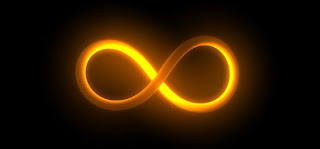
The Doctrine of Eternal Recurrence: Of all the doctrines of Nietzsche this is the hardest to understand and also to take seriously. On the face Nietzsche appeared to say that history moves in epicycles and that all history comes round again and again. For example, according to Nietzsche we have sat in this classroom over and over again. In his work Nietzsche says, "I felt as though I was a new pen being tried out by a superior power on a small piece of paper."
However, the reader of Nietzsche should remember that this is a theory of morality not being. According to Nietzsche's concept of Eternal Recurrence our actions should be so superior and grand that we should be willing to try them over and over again in recurrence, ad infinitum. By such willingness you are actually embracing life and saying, "yes" to life according to the Philosopher.
In a very real sense this concept of Eternal Recurrence is therefore a huge metaphor and the concept should not be taken literally. This is part of his grand and effective literary style. Understanding Nietzsche's concept of Eternal Recurrence as a literary device removes the perceived absurdity of the concept proposed by Nietzsche and also heightens its significance as well as providing practical relevance.
The Death of God: Addressing the results of the death of God Nietzsche writes proposes that rather than cope with the unbearable loneliness of their condition, humanity will continue to seek their shattered god and for his sake they will love the very serpents that dwell among his ruins." The mixture of "loneliness" and "serpents" and death of God" serves as a metaphorical description of the present human and cultural status. Rather than cope with the unbearable loneliness of their condition, men will continue to seek their shattered god and for his sake they will love the very serpents that dwell among his ruins."
But the question emerges as to what exactly the phrase "the death of God" actually signifies. What does this enigmatic phrase mean? Was there an actual event that constitutes the death of God? Nietzsche utilized the phrase to speak of the current empty status lying behind the human condition. The death of God has occurred both to those with "gods" and to those who have no "gods." To all categories of humanity in relationship to god, whether passive, angry, zealous, God is dead and life is empty. It seems that Nietzsche is acknowledging and proclaiming that the "notion of God" no longer holds the significance that it once offered. The notion of "God" no longer has the capacity to transform life. Individuals may pay lip service to god, go through the motions of devotion to god, verbally express allegiance to God, but all of these are empty.
Nietzsche's work at this point contains a positive element if we only can get behind the negativity and melancholia, which meets us at first glance in his conclusion that God is dead. Behind the statement is Nietzsche's notion that belief should actually transform life, provide answers to the ultimate questions of life and in the process transform one's very character. This is what a "belief" is supposed to do. Consequently, we are left to "fend for ourselves". (Interestingly in his work, Nietzsche comments regarding the churches, "What are these churches now if they are not the tombs and sepulchers of God?" Dark but nonetheless true.)

